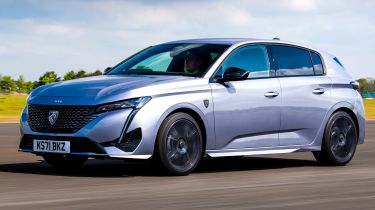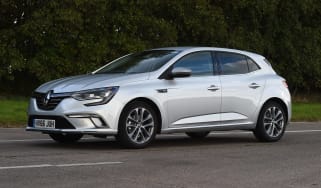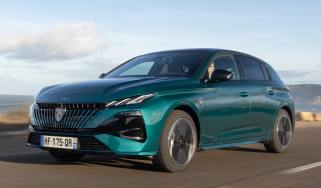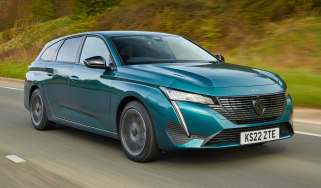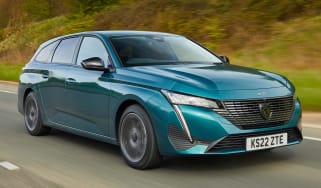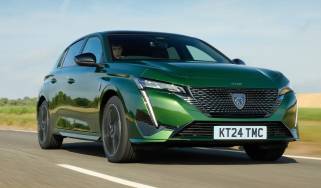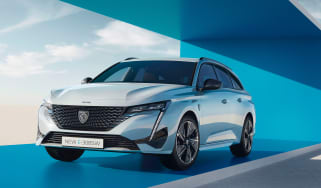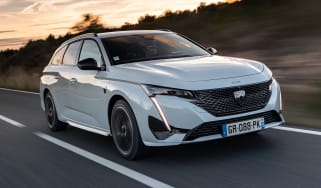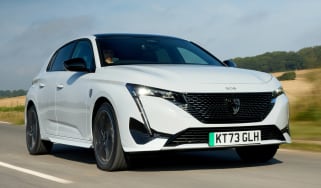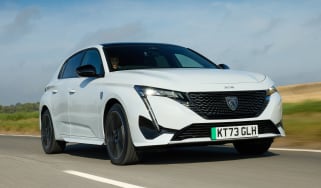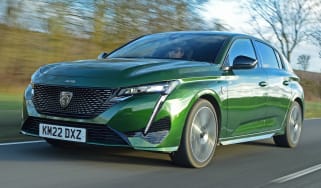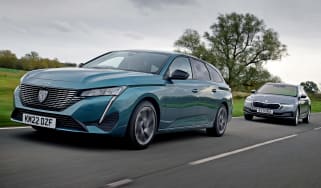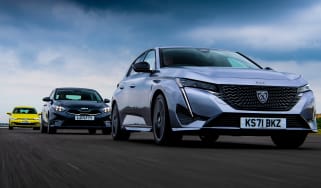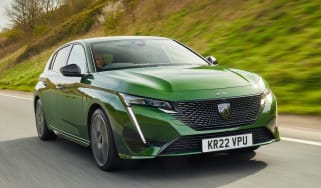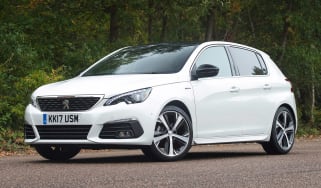Peugeot 308 review
With its striking good looks, the Peugeot 308 is a desirable five-door hatchback, but it sacrifices practicality and isn’t great to drive

Buyers looking for an eye-catching family hatchback that offers a little more character and (dare we say it) Gallic flair than other mainstream rivals, could find the Peugeot 308 an interesting option. The French family car is bestowed with an air of quality that means it will have other premium hatches from the likes of Audi and BMW well in its sights.
But the 308 isn’t quite the complete package; its cramped rear seats won’t win favour from passengers, while its insipid handling and imprecise automatic gearbox will disappoint keener drivers. Improved onboard technology and decent levels of refinement are plus points that help to make the 308 a desirable choice, but other, admittedly less handsome, hatchbacks offer better value for money.
About the Peugeot 308
Peugeot knows a thing or two about making a good-looking hatchback. From the iconic 205 and 306 of the 80s and 90s, to the sharp styling of the current 208 supermini, the French car maker has often prioritised cars that draw in buyers with a real sense of desirability.
Peugeot sought out famed design firm and coachbuilder Pininfarina to come up with the blueprint for the 306, along with the sleek 406 Coupe, while the double-bubble roof of the sporty RCZ coupe was inspired by another Italian coachbuilding company, Zagato.
Used - available now
So, we’ve established Peugeot’s design credentials, and it's clear from just a quick glance at the 308’s dramatic, rakish look that the manufacturer wants buyers to sit up and take notice. Its distinctive style makes some rivals feel a bit ordinary and definitely helps the 308 stand out in a crowded hatchback market.
Competition is fierce, with mainstream perennials such as the Ford Focus, Honda Civic, Vauxhall Astra and SEAT Leon all vying for attention, while the Korean pair of the Kia Ceed and Hyundai i30 are worth equal consideration. More premium opponents come in the form of the Audi A3, BMW 1 Series and the Mercedes A-Class, but such is the 308’s push upmarket that it won’t be shying away from taking on this talented trio.
The front-wheel-drive 308 offers a range of petrol, diesel and plug-in hybrid (PHEV) powertrains; the 1.2-litre Puretech petrol unit produces 130bhp, while the 1.5-litre BlueHDi diesel follows closely behind with 129bhp. The PHEV model uses a 1.6-litre petrol engine alongside a 12.4kWh battery and single electric motor to deliver either 178bhp or 222bhp. An eight-speed automatic transmission is standard across the range.
Standard equipment is reasonably generous and includes 16-inch alloy wheels, automatic headlights and wipers, auto air-conditioning, rear parking sensors and Peugeot’s i-Cockpit twin-screen set-up that covers driver information and infotainment systems. However, we’d recommend upgrading to either the Allure or Allure Premium specification which sets off the 308’s overall look a little better than the entry-level Active Premium’s sparser appearance.
For buyers willing to spend a bit more, there’s the sporty GT model (the GT Premium model is no longer available), although you’ll need around £33,000 to secure a petrol version and nearer £42,000 for a plug-in hybrid version. The 308 SW estate model is also available, offering increased practicality and starting from around £29,000.
The all-electric e-308 began production in 2023 and, much like the combustion models, buyers have the choice of a hatchback or SW estate. Peugeot claims the 54kWh battery will achieve over 248 miles of range on the WLTP combined cycle. The Peugeot E-308 is among a growing number of EVs that qualify for the Government's Electric Car Grant (ECG) announced in July 2025. The E-308 is eligible for a £1,500 discount, which is applied automatically when you buy.
Performance & driving experience
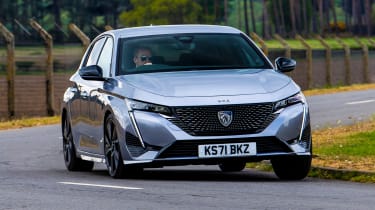
Thinking back to the great Peugeot hot hatchbacks of the past, you might be forgiven for expecting the latest 308 model to be a driver’s delight. Unfortunately, it isn’t, and the first signs are evident as soon as you slip into the driver’s seat, because trying to find a comfortable driving position can be a bit of a chore.
Forward visibility isn’t great because you sit quite low in the car; if you’re on the short side you’ll need to raise the seat high with the steering wheel position set low just to be able to get a decent view of the i-Cockpit digital dials, which all feels a little odd.
The 308 is fairly nimble in and around town, however, with its quick steering providing good feel and precision, although the small, stylish-looking wheel won’t be to everyone’s tastes. Both the driver and passengers will find the ride perfectly comfortable, though, with the 308’s suspension set-up adequately able to smooth out any bumps in the road.
One big gripe we have is with the French hatchback’s eight-speed automatic transmission. It’s standard across the range with no manual option available, which is a shame because it feels quite awkward at times – not quick enough to pick up when attempting to pull away from a junction and taking time to engage at the end of a low-speed coast. You’ll find bringing the 308 to a chauffeur-smooth standstill a bit of an onerous task, too, with the stop-start system a little unsure of itself.
0-62mph acceleration and top speed
If you’re looking for extra pace, then the plug-in hybrid model is the one to go for. The 178bhp version manages the 0-62mph sprint in 7.6 seconds, while the extra £1,400 needed for the 222bhp PHEV only buys an extra tenth of a second.
The 1.2-litre PureTech petrol car delivers 129bhp and a 0-62mph time of 9.7 seconds, which is respectable enough; opting for the 1.5-litre BlueHDi diesel (with 300 Nm of torque) adds the best part of a second to this time.
MPG & running costs

With a starting price of more than £28,000, rising to around £42,000 for a top-spec plug-in hybrid model, the Peugeot 308 isn’t particularly cheap to buy. It does, however, provide strong fuel economy figures across the range.
A petrol-engined 308 should average around 43.3mpg (under the current WLTP testing procedure), although this could be as high as 51.9mpg if you go for a version with smaller wheels and less kit.
Opting for diesel power brings obvious improvements to fuel economy – the 1.5-litre BlueHDi unit fitted to the 308 claims between 50.1-59.6mpg on the WLTP combined cycle. During our own testing of the 308 diesel, we saw an average of 54.1mpg.
CO2 emissions, at 123-148g/km, aren’t particularly impressive, although with the industry march towards full electrification, it’s harder than ever for pure petrol and diesel cars to sell their green credentials. Company car drivers probably won’t be rushing to secure a purely-combustion powered model because these CO2 outputs incur a Benefit-in-Kind tax rate (BiK) of 30-31 per cent.
The 308 plug-in hybrid models offer wider appeal, firstly with the ability to run on electric power alone for around 40 miles and also by producing far lower CO2 levels (23-25g/km). This means BiK rates start from just 8 per cent. It’s important to remember, though, that the PHEV versions are significantly more expensive to buy than their fossil-fuelled siblings.
After covering over 6,000 miles in our plug-in hybrid Peugeot 308 Allure Premium long-term test car, we struggled to achieve over 20 miles of EV range. However, it did return well over 70mpg.
Insurance
Choose any pure petrol or diesel-powered 308 model and insurance costs should be fairly reasonable. Most versions fall into insurance group 19, with the GT and GT Premium cars in either group 20 or 21.
Premiums will probably get a little more expensive if you move up to the 177bhp plug-in hybrid, because it starts from group 26, while the 222bhp PHEV is in group 29 or 30, depending on which trim you specify.
Depreciation
Residual values were not a strong point for the previous-generation 308. After a typical three-year/36,000-mile ownership period, buyers could only expect to see a return of around 39 per cent of their car’s original value come trade-in time.
The latest 308 range fares much better, retaining 47-49 per cent of the initial price after 36 months of driving. There’s little difference between the petrol, diesel and plug-in hybrid versions, although the SW estate fares slightly better than the hatchback. This version holds on to up to 50 per cent of its initial value.
To get an accurate valuation on a specific model check out our free car valuation tool...
Interior, design & technology
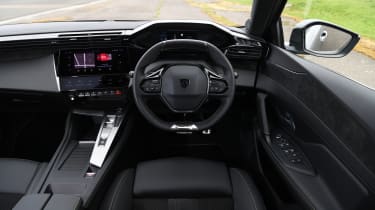
It was important for the success of the third-generation 308 that it employed some form of electrification to help boost efficiency and to remain competitive with its close rivals. The latest model sits on a revised version of the company’s EMP2 platform, which allows for petrol, diesel, plug-in hybrid and electric powertrains and was developed prior to the manufacturer being absorbed into the Stellantis group. It’s the same basic architecture that underpins its Vauxhall Astra and DS 4 stablemates.
From the outside, Peugeot’s five-door hatchback certainly catches the eye. It’s not only the company logo that’s had an overhaul, so has the 308’s styling, with a rakish front design and sharp creases along the shoulder line leading to a good-looking rear. It’s definitely a bit of a head turner, particularly if you go for one of the more distinctive body colours: we’d recommend either the Olivine Green, Elixir Red or Vertigo Blue paint options
Things get even better once you’re sitting inside the 308’s cabin, where it’s noticeable how much focus Peugeot has applied to improving overall quality. It feels like a genuine challenger to premium models such as the Audi A3, and easily outclasses the Mk8 Golf, which wouldn’t have even been thought of just a few years ago.
Peugeot’s i-Cockpit system is standard on all models, but takes a bit of getting used to. It incorporates a 10-inch media touchscreen and a digital driver’s display of the same size which work well enough, but the small steering wheel design means you have to peer over the top to be able to see the dials, rather than looking straight through. It’s an unusual arrangement, and we’d advise having a decent test drive to see whether it feels right for you.
Sat-nav, stereo and infotainment
The 308 was the first Peugeot to benefit from a newly updated user interface for its infotainment set-up. While it’s a huge improvement over the systems in previous models, it’s still not without its flaws.
On the great side is the screen itself. The resolution is very high, which means that the graphics are crisp and clear, and the rear-view camera looks as detailed as the best systems on the market. Beneath the main display sits a bank of touch-sensitive shortcut keys, which can be customised to show the controls you use the most. Loading times are excellent, too.
However, Peugeot has chosen to stick with the same climate-control arrangement, so all functions are selected via the touchscreen, including temperature controls that take up space on either side of the screen in some menus. Other brands have found a better touchscreen solution, but we would prefer physical controls.
Boot space & practicality
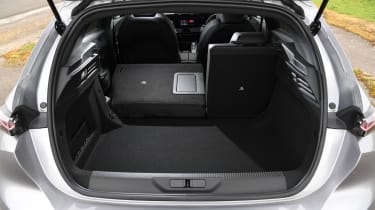
Peugeot has crammed in a lot of standard kit to help make the 308 cabin a comfortable place to be. The steering wheel adjusts for reach and rake, there’s a front armrest and a centre console housing two cup holders, while the driver will appreciate the automatic function for the headlights and wipers, along with voice recognition for the phone and sat-nav systems.
Cruise control and rear parking sensors add to the 308’s practicality, as does the 60:40 split-folding rear seat configuration which is convenient if you need to transport bulkier items but still need space for passengers.
Dimensions and size
Measuring 4,365mm from head to tail, the 308 sits between the Ford Focus (4,378mm) and Volkswagen Golf (4,284mm) in terms of overall length. The French hatchback is the widest of the three, at 2,062mm, although at 1,465mm high, sits lower to the ground than its two rivals.
Legroom, headroom & passenger space
As mentioned above, the 308 has a lower roofline than both the Ford Focus and VW Golf, and it tapers away even more towards the rear of the car. While this design trait helps the 308 look suitably sporty, it hampers interior space for rear passengers, and taller occupants may find it a little uncomfortable.
We also found the wide C-pillars and small rear windows made it feel a little claustrophobic in the back, so if you’re going to be regularly ferrying passengers around you may wish to consider an alternative five-door hatchback.
Boot space
The 308 makes up for its compromised rear passenger space with a decent-sized boot. At 412 litres, it’s luggage capacity betters that of the Golf, Focus and Kia Ceed, although it won’t trouble the load lugging skills of the Skoda Octavia which offers a class-leading 600 litres. There’s a slight penalty on overall boot space if you opt for the 308 plug-in hybrid model, with the PHEV offering just 361 litres.
Towing
If you’re thinking of putting your 308 to use as a towing vehicle, you’d be better off with the BlueHDi diesel model which is rated at 1,550kg in terms of braked trailer towing capacity. The plug-in hybrid models are almost as capable, able to tow up to 1,500kg.
Reliability & safety
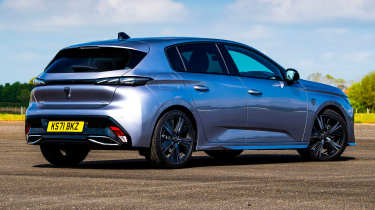
The 308 includes a raft of standard active safety kit with lane-keep assist, a speed limit recognition function, a driver attention warning and an Active Safety Brake system all included with the entry Active Premium model.
Allure Premium versions and above benefit from Peugeot’s Drive Assist Pack which adds adaptive cruise control, a rear cross traffic alert (providing a warning if approaching cars are detected as you’re reversing) and a long-range Blind Spot Detection system.
Industry safety body, Euro NCAP, tested the 308 in May 2022 and awarded it a four-star rating out of five. Adult and child occupant protection scores were good at 76 per cent and 84 per cent respectively, but the vulnerable road users (68 per cent) and safety assist (65 per cent) categories didn’t fare so well.
Specifically, Euro NCAP highlighted the poor areas of protection offered by the 308’s bonnet to the head of a struck pedestrian in the event of a collision, and also rated Peugeot’s autonomous emergency braking system as marginal in terms of how it responded to other cars on the road.
Peugeot placed a respectable 9th out of 32 manufacturers in our 2023 Driver Power customer satisfaction survey. The 308 itself is yet to appear in our best cars to own poll, although the 2008 crossover, 3008 SUV and 208 supermini were all represented in the 75-strong list.
Warranty
The 308 is covered by a three-year warranty, with unlimited mileage for the first two years and a 60,000-mile limit applied to the third year. Hyundai and Kia both offer more comprehensive warranties at five and seven years respectively.
Servicing
Peugeot Service Plans cover scheduled maintenance costs for up to five years, with various mileage options. You can pay on a monthly basis, although the plug-in hybrid models cost a little more than the regular petrol or diesel versions.

